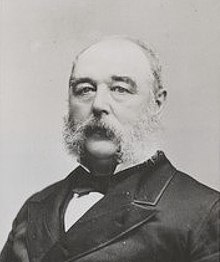William H. Wickham
William Hull Wickham (July 30, 1832 – January 13, 1893) was the 81st Mayor of New York City and anti-Ring Democrat who helped to topple corrupt politician Boss Tweed.
William H. Wickham | |
|---|---|
 Photograph of Wickham by C.D. Fredericks and Co. | |
| 81st Mayor of New York City | |
| In office January 1, 1875 – December 31, 1876 | |
| Preceded by | Samuel B. H. Vance (Acting) |
| Succeeded by | Smith Ely Jr. |
| Personal details | |
| Born | William Hull Wickham July 30, 1832 Smithtown, New York, U.S. |
| Died | January 13, 1893 (aged 60) New York City, U.S. |
| Political party | Democratic |
| Spouse(s) | Louise Floyd |
| Children | 1 |
Early life
Wickham was born in Smithtown on Long Island, but was raised in New York. He was the son of Daniel H. and Ruth Wickham, who lived at 71 West 11th Street in New York.[1]
He was a distant cousin of John Wickham, the attorney for Aaron Burr during his trial for treason. It was Burr who transformed Tammany into a political machine for the election of 1800.
Career
Early in his career, he worked for the Pacific Mail Steamship Company and was a volunteer fireman. Wickham joined Mutual Hook and Ladder Company No. 1 in 1850 and served as foreman. In 1854, he organized the Baxter Hook and Ladder Company No. 15. He was elected Secretary of the New York Fire Department in 1858, Vice President in 1859, and President from 1860 until 1861.
Political career
In the early 1870s, Wickham became an anti-Ring Democrat opposed to Boss Tweed of Tammany Hall. Wickham served as Chairman of the Apollo Hall Democracy, a political group that worked to bring Boss Tweed to justice. He also served on the Executive Committee of Seventy, a group formed by the public to reestablish honest government.
In 1874, Wickham was nominated by the Democrats to be Mayor of New York, with the support of a temporarily reformed Tammany Hall.[2] He easily defeated Oswald Ottendorfer, the Independent Democratic candidate, and Salem H. Wales, the Republican. During his two-year tenure starting in 1875, Wickham appointed William C. Whitney to be the City of New York's legal counsel to combat political fraud.[3][4] Wickham also conducted fundraising for the pedestal of the Statue of Liberty.[5]
Wickham declined to be re-nominated in 1876.[6] He served on the Board of Education for several years and was a member of the Committee of One Hundred for New York's Columbian celebration.
Personal life
He was married to Louise Shepard Floyd (1836–1899),[7] the daughter of Jesse Woodhull Floyd (1787–1849) and Miami (née Shepard) Floyd (1795–1880).[8] Together, they were the parents of a daughter:
- Louise Floyd Wickham (1858–1933),[9] who did not marry and who attended Miss Porter's School in Farmington, Connecticut.[10]
After the death of his sister, he adopted her three grown children, one son and two daughters, as his own, and they all lived together at his home.[1]
He died at his home, 338 Lexington Avenue, in New York City on January 13, 1893 from heart disease along with his ailment of Bright's Disease.[1]
Legacy
He also has a street named after him in the north Bronx.
References
- "William H. Wickham". New York Times. January 14, 1893. Retrieved 2008-06-06.
- "Mayor Havemeyer's Case.; the Governor Declines to Remove Him. Action of the Mayor, Condemned the Governor's Views on the Power of Appointment--Gov. Dix's Decision in Full". The New York Times. 15 September 1874. Retrieved 19 December 2017.
- "The New Mayor's Message; the Government of the City Reviewed. What He Approves and Disapproves--His Opinion of Albany Legislation--the Financial Position of the City--the Police Board to Be Non-Partisan--Miscellaneous Topics. Finances. Municipal Expenditures. Claims and Litigations. State Taxes. Public Works. Central Park. Docks. Public Buildings. Police Department. Street Cleaning. Fire Department. Health Department. Taxes and Assessments. the City Prison. Markets. City Ordinances. City Record. Rapid Transit. Brooklyn Bridge. Albany Legislation". The New York Times. January 5, 1875. Retrieved 19 December 2017.
- "The Mayor's Message.; the Continued Issue of Bonds Opposed--the Assessments for Public Improvements--Heavy Charges for Street Openings--Attempts Leading to an Increase of the Debt Should Be Frowned down, Unless Promoted by the Aldermen. the Common Council and the Issue of Bonds. a Call for Legislation. Assessments and Street Openings. Repairing Sewers. the Supply of Water. the Dock Department. Departmental Works. the Duty of the Board". The New York Times. 19 March 1875. Retrieved 19 December 2017.
- "Wickham and Kelly". The New York Times. 31 August 1875. Retrieved 19 December 2017.
- "Honors to Mayor Wickham". The New York Times. 31 July 1875. Retrieved 19 December 2017.
- "DIED. Wickham". The New York Times. January 21, 1899. Retrieved 19 December 2017.
- The Jewelers' Circular and Horological Review. Jewelers' Circular Publishing Company. 1898. p. 27. Retrieved 19 December 2017.
- "DIED. Wickham". The New York Times. 27 November 1933. Retrieved 19 December 2017.
- "MISS LOUISE F. WICKHAM. Only Daughter of the Late Mayor Wickham of New York". The New York Times. 28 November 1933. Retrieved 19 December 2017.
| Political offices | ||
|---|---|---|
| Preceded by Samuel B. H. Vance |
Mayor of New York City 1875–1876 |
Succeeded by Smith Ely, Jr. |